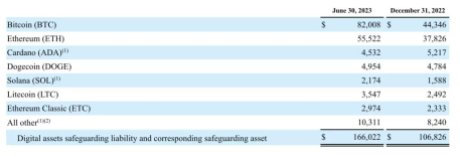In a bold and contentious statement, Caitlin Long has asserted that 99% of the crypto industry should be eliminated to decrease leverage buildup and improve the industry’s future advancement.
Industry Overhaul Demanded For Sustainability
Caitlin Long, Founder and CEO of Custodia Bank, a crypto asset banking company, has called for a seismic change in the crypto industry and its practices. The CEO emphatically suggested that only 1% of the crypto industry should be allowed to operate while 99% of the industry should be destroyed and the majority of crypto firms in the industry “flushed out.”
In a heated interview with Bezinga, Long was adamant about her controversial views of the crypto industry, stating that the industry had enormous potential but was being set back significantly by crypto firms operating using highly leveraged trading activities.
Long stated that she had an active discussion with a distinguished individual who shared her views and supported the notion that the majority of the industry needs to be purged for it to thrive.
“I had a debate with a prominent person. I said, ‘Look, 90% of this industry still needs to go away, and he said it’s 99%, and I think that’s right. I mean whether it’s 90% or 99%, you see the point, there’s still a bunch of crap that needs to be flushed out,” Long said.
Long Compares Crypto Industry To 1999 Tech Stock Bubble
Caitlin Long has likened the current crypto industry to the tech stock bubble in 1999. Notably, the tech stock bubble which coincided with the growth of internet adoption, rose 800% in investments, attracting investors from prominent companies all over the world. After reaching its peak, the stock market crashed by 740%, leaving the majority of investors and companies bankrupt and shut down.
Long compares this stock market crash to the crypto market crash in 2022 which saw Bitcoin falling by about 70% and major altcoins by 80% to 90%, resulting in the bankruptcy of major firms and investors.
She also stated that the crypto industry would not succeed if it continues to amplify trading activities through leverage while allowing unregulated exchanges to operate.
“It is in some ways a repeat of the tech stock bubble of 1999, just so much crap. And it will not succeed, and it needs to be flushed, but markets are flushing it,” Long stated.
Long suggested that a lack of proper regulations on crypto exchanges is exacerbating the risks and challenges in the crypto space. Additionally, she revealed that she was in support of the US Securities and Exchange Commission’s (SEC) recent crackdown on crypto exchanges in the industry.
Nevertheless, the CEO has not proposed a total annihilation of the crypto industry, just a major portion of it. When asked about her views on the Bitcoin cryptocurrency, Long stated, “I don’t really care about the price. It is the least interesting aspect of this technology. I’m more interested in it as a technology.”
























